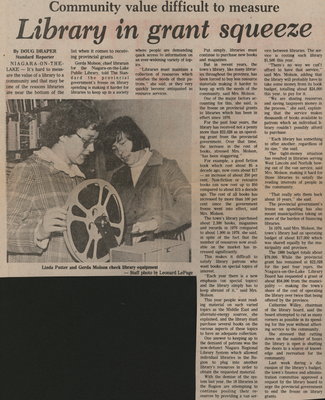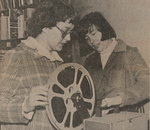Community value difficult to measure. Library in grant squeeze
By Doug Draper
Standard Reporter
NIAGARA-ON-THE-LAKE — It's hard to measure the value of a library to a community and that may be one of the reasons libraries are near the bottom of the list when it comes to receiving provincial grants.
Gerda Molson, chief librarian for the Niagara-on-the-Lake Public Library, told The Standard the provincial governments freeze on library spending is making it harder for libraries to keep up in a society where people are demanding quick access to information on an ever-widening variety of topics.
"Libraries must maintain a collection of resources which satisfies the needs of their patrons she said, or they very quickly become antiquated as resource services.
Put simply, libraries must continue to purchase new books and magazines.
But in recent years, the towns library, like many libraries throughout the province, has been forced to buy less resource materials making it harder to keep up with the needs of the community, said Mrs. Molson.
One of the major factors accounting for this, she said, is the freeze on provincial grants to libraries which has been in effect since 1976.
For the past four years, the library has received not a penny more than $22,028 as an operating grant from the provincial government. Over that time, the increase in the cost of books, stressed Mrs. Molson, "has been staggering."
For example, a good fiction book which cost about $5 a decade ago, now costs about $17 — an increase of about 250 per cent. Non-fiction or resource books can now cost up to $50 compared to about $15 a decade ago. The cost of all books has increased by more than 100 per cent since the government freeze went into effect, said Mrs. Molson.
The towns library purchased about 2,300 books, magazines and records in 1976 compared to about 1,900 in 1979, she said, in spite of the fact that the number of resources now available on the market has increased significantly.
This makes it difficult to satisfy library patrons who want books on special topics of interest.
"Each year there is a new emphasis (on special topics) and the library simply has to keep abreast of it," said Mrs. Molson.
This year people want reading material on such varied topics as the Middle East and alternate-energy sources, she explained, and the library must purchase several books on the various aspects of these topics to have an adequate collection.
One answer to keeping up to the demand of patrons was the now-defunct Niagara Regional Library System which allowed individual libraries in the Region to plug into another library's resources in order to obtain the requested material.
With the demise of the system last year, the 18 libraries in the Region are attempting to continue pooling their resources by providing a van service between libraries. The service is costing each library $1,500 this year.
"There's no way we can't afford to have that service," said Mrs. Molson, adding that the library will probably have to take some money from its book budget, totalling about $24,000 this year, to pay for it.
"We are sharing resources and saving, taxpayers money in the process," she said, explaining that the service makes thousands of books available to patrons which an individual library couldn't possibly afford to purchase.
"Each library has something to offer another, regardless of its size," she said.
The tight-money situation has resulted in libraries serving West Lincoln and Norfolk bowing out of the van service, said Mrs. Molson, making it hard for those libraries to satisfy the reading interests of people in the community.
"That really sets them back about 10 years," she said.
The provincial government's freeze on spending has also meant municipalities taking on more of the burden of financing libraries.
In 1970, said Mrs. Molson, the town's library had an operating budget of about $17,000 which was shared equally by the municipality and province.
The 1980 budget totals about $79,000. While the provincial grant has remained at $22,028 for the past four years, the Niagara-on-the-Lake Library Board has requested a grant of about $54,000 from the municipality — making the town's share of the cost of operating the library over twice that being offered by the province.
Catherine Willey, chairman of the library board, said the board attempted to cut as many corners as possible in its spending for this year without affecting service to the community.
She stressed that cutting down on the number of hours the library is open is shutting the doors to a source of knowledge and recreation for the community.
Last week during a discussion of the library's budget, the town's finance and administration committee approved a request by the library board to urge the provincial government to end the freeze on library grants.





